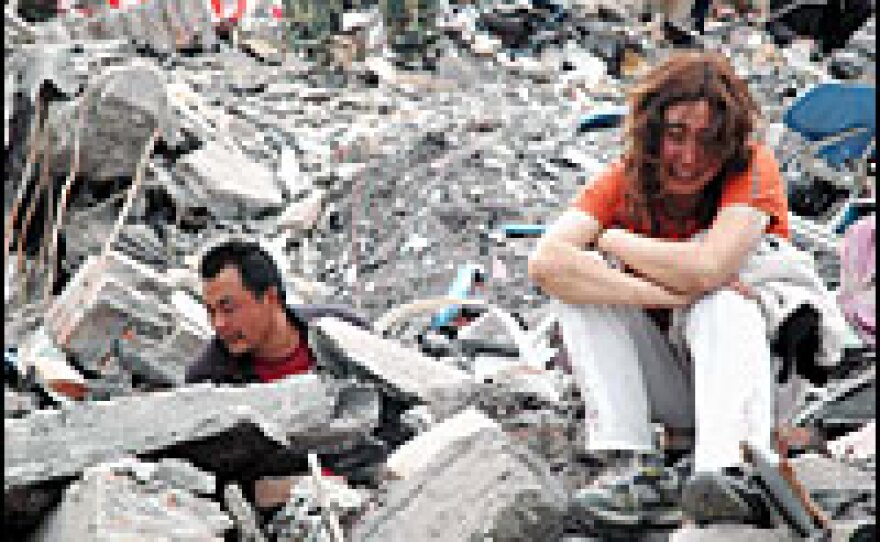

Rescue workers are having a hard time getting heavy equipment to isolated towns and villages in Southwestern China after Monday's earthquake. Thousands of residents are still buried beneath buildings, and survivors are worried about the aftereffects of the disaster.
Mianyang city has suffered the most casualties in Sichuan, and the county town of Beichuan is one of the worst off. Parts of the road through the mountains are destroyed, and it takes a couple of hours by motorcycle and on foot to get in.
The government has set up a logistics base at a high school outside the town. It's a beehive of grim and purposeful activity.
Recovering Bodies, Survivors
Soldiers are lining up in camouflage behind big red flags; they're wearing white surgical masks, apparently to protect them from disease. The bodies of those recently dug out of the rubble are lying in the grassy area next to huge cans of disinfectant.
Outside, villagers who have walked for days down from the mountains are piling into trucks to be taken to stadiums and tent cities.
A column of dusty and sweaty American volunteers trudges into the base. They were organized by the Kansas-based aid group Heart to Heart International. Premier Wen Jiabao personally thanked the group as he toured the area.
"We're down there all day today, went in fairly early this morning, not finding many survivors but still finding some," said Brian Sweeney of Atlanta, who is a construction consultant in Chengdu. "Found a little girl that's actually very close, right up the road here, quite a few other ones that are buried alive, but not sure that people can get to them, they're fairly deep. I think the problem is obviously the roads are out, it's very difficult to get heavy equipment in, so everything is having to be done by hand."
Repaying Kindness
The scene inside Beichuan is apocalyptic. The earthquake triggered landslides that demolished most of the town. Reports say up to 5,000 people were killed and that rescuers have gotten to fewer than half of those trapped under the rubble.
Volunteer Li Shuxi clambers over concrete piled 20 feet above what used to be a busy shopping street. A dog teeters on the windowsill of a crumpled building. Flies buzz around partially exposed corpses.
"My home is in Tangshan, and I lived through the great earthquake of 1976," Li says, "so I can really relate to what's happening here. Back then, people from all over the country came to help us, so now I'm just repaying their kindness."
Using just crowbars and shovels, rescuers pull a middle-aged woman out of the rubble and carry her out of town on a stretcher.
Nearby, business manager Jiang Tao is waiting for the heavy machines to get into town and try to save his wife, who he believes is trapped under the remains of her office building. Jiang bicycled through the night to get here. He's dissatisfied with the rescue effort.
"The rescuers got here too late. I got here at 6 a.m. The soldiers came at 8, but there were only 300 of them, and they had no tools except for shovels. I understand that nobody expected this earthquake. But the relief effort has to be effective and fast. As an observer, I've had to say that it was neither."
'I've Run Out of Tears to Cry'
By now, many bereaved local residents are numb.
A construction worker, who gave only his family name, Zhou, sat amid the rubble in nearby Thunder Drum township.
"I haven't found my mother or my son," he says. "I'm past the initial pain. I've run out of tears to cry. All that's left is to find them. And if I can't find them, well, there's nothing I can do about it."
Other residents are worried about the aftereffects of the earthquake. In nearby Sunflower village, residents are out on the road begging for water. Villager Wang Xiuhong explains.
"We're very close to Beichuan. So many people died up there, and it's very hot. We're afraid that the decomposing bodies have contaminated our water supply. We've got a well here, but we don't dare drink from it."
There are already around 10,000 medical personnel in the disaster zone, but the government is hard pressed to help all the injured and homeless. The government urges residents to, as one banner near Beichuan put it, "actively save yourself."
Copyright 2022 NPR. To see more, visit https://www.npr.org. 9(MDAzMjM2NDYzMDEyMzc1Njk5NjAxNzY3OQ001))






